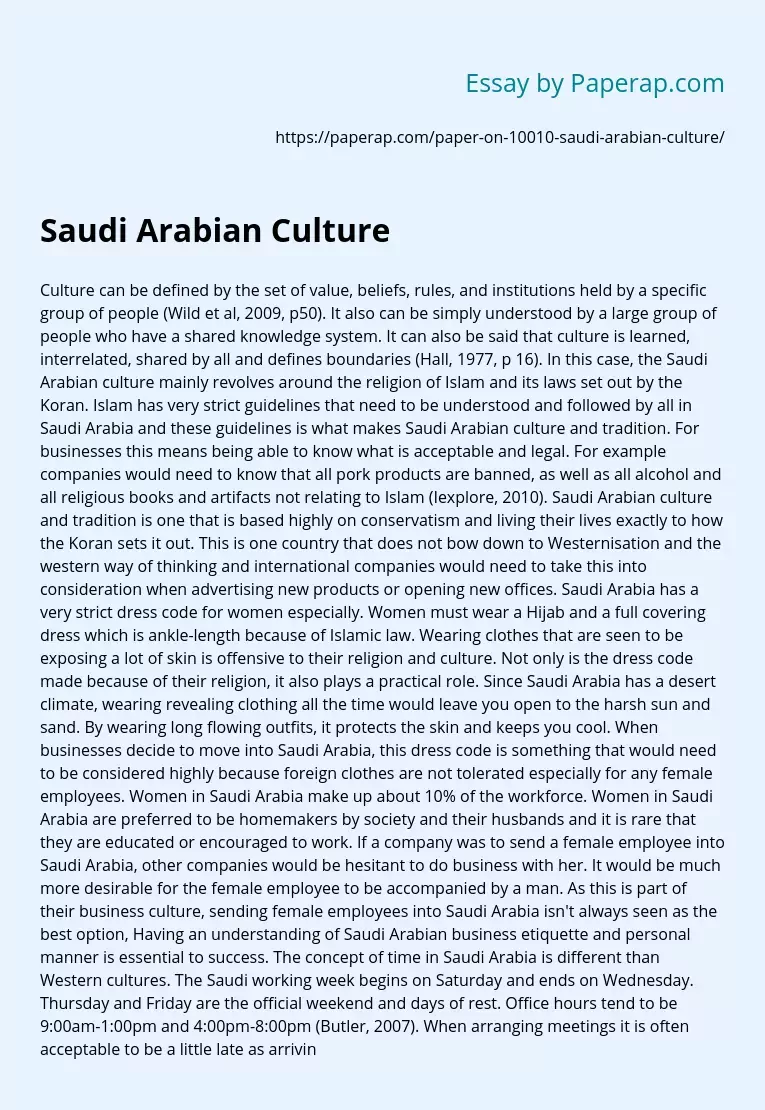Saudi Arabian Culture
Culture can be defined by the set of value, beliefs, rules, and institutions held by a specific group of people (Wild et al, 2009, p50). It also can be simply understood by a large group of people who have a shared knowledge system. It can also be said that culture is learned, interrelated, shared by all and defines boundaries (Hall, 1977, p 16). In this case, the Saudi Arabian culture mainly revolves around the religion of Islam and its laws set out by the Koran.
Islam has very strict guidelines that need to be understood and followed by all in Saudi Arabia and these guidelines is what makes Saudi Arabian culture and tradition.
For businesses this means being able to know what is acceptable and legal. For example companies would need to know that all pork products are banned, as well as all alcohol and all religious books and artifacts not relating to Islam (Iexplore, 2010). Saudi Arabian culture and tradition is one that is based highly on conservatism and living their lives exactly to how the Koran sets it out.
This is one country that does not bow down to Westernisation and the western way of thinking and international companies would need to take this into consideration when advertising new products or opening new offices.
Saudi Arabia has a very strict dress code for women especially. Women must wear a Hijab and a full covering dress which is ankle-length because of Islamic law. Wearing clothes that are seen to be exposing a lot of skin is offensive to their religion and culture.
Not only is the dress code made because of their religion, it also plays a practical role. Since Saudi Arabia has a desert climate, wearing revealing clothing all the time would leave you open to the harsh sun and sand. By wearing long flowing outfits, it protects the skin and keeps you cool.
When businesses decide to move into Saudi Arabia, this dress code is something that would need to be considered highly because foreign clothes are not tolerated especially for any female employees. Women in Saudi Arabia make up about 10% of the workforce. Women in Saudi Arabia are preferred to be homemakers by society and their husbands and it is rare that they are educated or encouraged to work. If a company was to send a female employee into Saudi Arabia, other companies would be hesitant to do business with her. It would be much more desirable for the female employee to be accompanied by a man.
As this is part of their business culture, sending female employees into Saudi Arabia isn’t always seen as the best option, Having an understanding of Saudi Arabian business etiquette and personal manner is essential to success. The concept of time in Saudi Arabia is different than Western cultures. The Saudi working week begins on Saturday and ends on Wednesday. Thursday and Friday are the official weekend and days of rest. Office hours tend to be 9:00am-1:00pm and 4:00pm-8:00pm (Butler, 2007). When arranging meetings it is often acceptable to be a little late as arriving in a timely manner is not an issue.
It is also useful to know that Saudis enjoy mixing business with pleasure. It is not uncommon for a business meeting to have a lot of small chit chat and friendly conversation rather than all business. But be careful to avoid topics such as religion, politics and women. When opening a business in Saudi Arabia it is also necessary to take into account their religious culture because this affects their day to day life. Companies must allow for prayer times which occur five times a day. They must also offer a place where Saudi’s can practice this.
Saudi Arabian Culture. (2017, Dec 04). Retrieved from https://paperap.com/paper-on-10010-saudi-arabian-culture/

